Imagine this.
You are catering for a wedding of 200 or more guests; but you’re still not quite sure what will be on the menu right up until the
day before.
Feel stressed just reading that?
Well, it doesn’t faze Orla McAndrew, who offers “zero waste” event catering by using surplus food from local suppliers that would otherwise most likely end up in landfill or the compost heap: which often means last minute deliveries and decisions.
“I’m in my complete element when that’s going on,” she laughs. “It’s an amazing creative experience.”
Not to mention eco-friendly, given that Orla estimates that she saves up to 225kg of food from the bin every time she does a zero-waste wedding: doing her bit for producers and the planet.
Finding her feet
While living in Cork since 1999, Orla is originally from Castlerea, Co Roscommon. She traces her love of food to her granny- who was the cook at the historic Clonalis House- and her grandfather, who was the gardener.
At 10, she moved to London with her mother, who ran her own business supplying home-made apple tarts to five star hotels. But while always a good cook, Orla was initially reluctant to enter the industry, and instead started a degree in international business
and French.
“It took me until I was 25 to finally succumb to food,” she admits. “I didn’t want to be a chef because I knew it was really bad hours, really bad pay and I was discouraged from it really.”
Having returned to college in her mid- twenties to study culinary arts, Orla worked in event management before setting up her own farmers’ market stall. It was here she got her first taste of food waste.
“Some days you’d go and you’re sold out completely within two hours and some weeks it’s teeming rain and you come back with everything and it’s perishable; and there’s no home for it,” she recalls.
After starting her family in her 30s, Orla took time out to be a stay-at-home parent; but found herself at a crossroads as she approached her 40th birthday as her children grew more independent.
“I thought, ‘God, what am I going to do with my life?’” she recalls. “I was a bit lost really.”

Orla McAndrew of Orla McAndrew Foods, Donoughmore, Co Cork picking vegetables at Waterfall Farms. \ Donal O' Leary
A chance meeting in a park in 2018, however, provided the next signpost, when Orla met a bride-to-be who had been let down by her caterer just weeks before her wedding. Orla decided she was ready for the challenge.
“I catered her wedding for 130 people six weeks later,” she continues. “? I obviously didn’t know what I was doing- but I had spent six weeks planning meticulously everything that could go wrong, to ensure nothing would go wrong; and it was such a success.”
Fighting food waste
There was one thing, however, that Orla was not happy with.
“I had obviously never catered for 130 people and I was using my ‘Irish mammy head’ and making sure I had plenty; but the one thing about that wedding that bothered me was that I had a huge amount of waste afterwards, because I just hadn’t worked it out properly,” she explains.
“I said, ‘I’m going to sit down now to properly calculate what’s needed for an event and I’m not going to be throwing away food like this.’ It was just abhorrent. I couldn’t do it.”
Through word of mouth, Orla continued to build her business, catering for events like communions and christenings and re-investing any profits into converting her garden shed into a professional kitchen.
Obviously, the outbreak of the pandemic in 2020 meant that all event catering was put on hold, but Orla says that her “real career took off when COVID came.” Initially, she pivoted into providing cheese and charcuterie boxes for home deliveries, followed by freezer meals for people who were cocooning.
She also became more active on social media, with activities such as cook-along videos, and started a series interviewing Irish food producers over Instagram live. Since her first catering event, Orla had been refining her portion control, but speaking with the producers planted another seed.
“Hearing their stories and thinking about all the effort they put into actually growing the food in the first place; and wondering what happens to the food that they can’t sell,” she explains.
“I just started thinking, ‘Surely there’s something more than could be done with that?’”
Zero waste weddings
That was the inspiration for Orla’s “zero waste weddings”, which she launched in 2022 after 18 months of development.
Here’s how it works. Having assembled a list of Irish suppliers- such as Waterfall Farms, SSI Wholesale Fish, and St Tola goats’ cheese- Orla contacts them before a wedding to see if they have any surplus food in stock that is coming to the end of its shelf life, or food that has not been sold because, for instance, it’s a less popular cut of meat, or “wonky” shaped vegetables.
The menu is then designed around what is available (see panel for the menu from her first zero waste wedding in 2022). Unsurprisingly, there was little in the way of leftovers that day.
“The last scoop that came out of the pot was for the last person,” she smiles. “For an average wedding of 220, it’s upwards of 225kg of food that you would otherwise be going out and buying and that you’re rescuing and using up.”
Showing respect
Zero waste weddings now constitute about 30% of Orla’s wedding bookings, but corporate events are also growing more popular. To avoid any supply gaps, she has two types of each producer on her books, but she does leave a contingency of 20% in case any key ingredients are not available at the last minute (e.g. meat or fish).
But for the rescued/surplus food, Orla stresses that she always pays the supplier fairly out of “respect” for their work.
“Thinking back to my own time at the farmers’ market stall, identifying with the pity of that loss,” elaborates Orla, whose catering packages range from €75-€95 per head (including staff), with 5% of profits from zero waste events going to the Peter McVerry Trust.
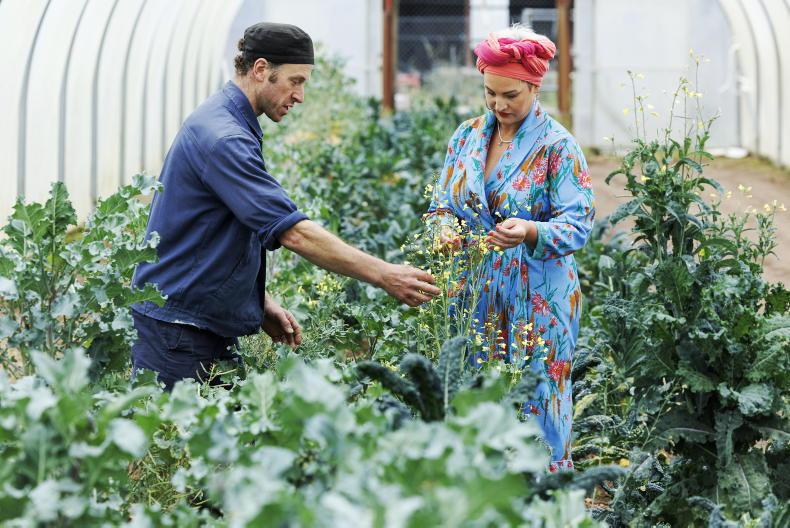
Orla McAndrew with Nigel Martin of Waterfall Farms. \ Donal O' Leary
She has just signed up for a masters on Irish food studies and food pathways to continue her own education; but is equally committed to empowering people to reduce food waste in their own homes by sharing practical tips through her social media.
Ultimately, though, for Orla, it’s about inspiring the next generation: daughters Nóra (10), Eva (8) and Ellie (4). In every sense.
“It’s literally the reason that I do everything,” she says?
“I really hope that I can lead by example.”
One of Orla’s most regular suppliers is Waterfall Farms Ltd, which is located close to Ballincollig, Co Cork.
Nigel Martin tells Irish Country Living that his father, Declan, began farming here in the mid-60s, starting with dry cattle, before branching into growing vegetables, supplying a major supermarket chain for close to 20 years.
When that contract ended in the 90s, they diversified into prepared vegetable products for catering e.g. for restaurants, cafes and juice bars. Today, Nigel and his brother Trevor run the business, though parents Declan and Rosemary are still involved, along with employing 17 staff and providing a diverse range of products.
“From a bunch of coriander to a bunch of rhubarb, to a carrot to a swede, baby leaf, edible flowers,” lists Nigel.
While supplying retail, the Martins saw first-hand the “trailer loads” of vegetables that were regularly rejected.
“Twisted carrots or a turnip that got mechanical damage to it or a head of lettuce where the outside leaf was slightly bad; stuff like that would automatically be rejected and thrown in the trailer for cattle feed,”
says Nigel.
As they now prepare veg themselves on site, they have much less waste and anything else that is left over can be diverted to feed or composted. Working with Orla, however, has also helped to utilise this valuable food.
“The likes of the heatwave we had there now for example, we might have had two or three plantings of lettuce or the likes come in at the one time,” says Nigel.
“Orla has been taking bits and pieces like that that would only be going into the compost heap, so it’s handy to get something for it.
“She’s very supportive and I commend her fully for what she’s achieved.”
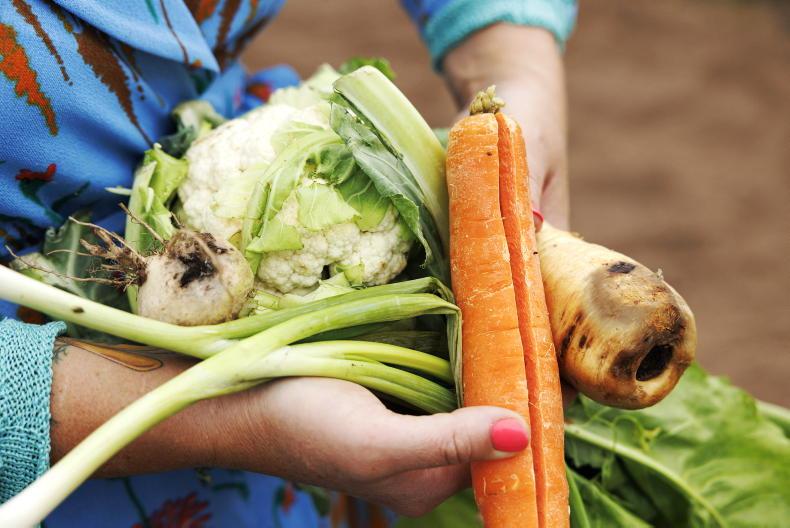
Orla McAndrew utilises food such as "wonky vegetables" that might otherwise go to waste. \ Donal O' Leary
Orla’s zero
waste wedding
Canapé reception
Ham and cheese croquettes
with spicy tomato sauce
Corned beef and potato cakes
with horseradish creme fraiche
St Tola goats’ cheese and herb
pesto puff pastry bites
Rabbit and blackberry filo parcels
Thai chilli chicken bites
Amuse Bouche
Carrot, ginger and celeriac soup
with homemade brown bread
Starter Course
Butternut squash, blue cheese
and spinach risotto with herb oil
and crushed walnuts
Main Course
Wagyu beef cassoulet with added
beef heart, creamy mashed potatoes
and roasted vegetables garnished
with vegetable crisps
Dessert
Eton mess with lemon curd
More info
Visit omcatering.ie
or follow on Instagram @orla_mcandrew_food
Imagine this.
You are catering for a wedding of 200 or more guests; but you’re still not quite sure what will be on the menu right up until the
day before.
Feel stressed just reading that?
Well, it doesn’t faze Orla McAndrew, who offers “zero waste” event catering by using surplus food from local suppliers that would otherwise most likely end up in landfill or the compost heap: which often means last minute deliveries and decisions.
“I’m in my complete element when that’s going on,” she laughs. “It’s an amazing creative experience.”
Not to mention eco-friendly, given that Orla estimates that she saves up to 225kg of food from the bin every time she does a zero-waste wedding: doing her bit for producers and the planet.
Finding her feet
While living in Cork since 1999, Orla is originally from Castlerea, Co Roscommon. She traces her love of food to her granny- who was the cook at the historic Clonalis House- and her grandfather, who was the gardener.
At 10, she moved to London with her mother, who ran her own business supplying home-made apple tarts to five star hotels. But while always a good cook, Orla was initially reluctant to enter the industry, and instead started a degree in international business
and French.
“It took me until I was 25 to finally succumb to food,” she admits. “I didn’t want to be a chef because I knew it was really bad hours, really bad pay and I was discouraged from it really.”
Having returned to college in her mid- twenties to study culinary arts, Orla worked in event management before setting up her own farmers’ market stall. It was here she got her first taste of food waste.
“Some days you’d go and you’re sold out completely within two hours and some weeks it’s teeming rain and you come back with everything and it’s perishable; and there’s no home for it,” she recalls.
After starting her family in her 30s, Orla took time out to be a stay-at-home parent; but found herself at a crossroads as she approached her 40th birthday as her children grew more independent.
“I thought, ‘God, what am I going to do with my life?’” she recalls. “I was a bit lost really.”

Orla McAndrew of Orla McAndrew Foods, Donoughmore, Co Cork picking vegetables at Waterfall Farms. \ Donal O' Leary
A chance meeting in a park in 2018, however, provided the next signpost, when Orla met a bride-to-be who had been let down by her caterer just weeks before her wedding. Orla decided she was ready for the challenge.
“I catered her wedding for 130 people six weeks later,” she continues. “? I obviously didn’t know what I was doing- but I had spent six weeks planning meticulously everything that could go wrong, to ensure nothing would go wrong; and it was such a success.”
Fighting food waste
There was one thing, however, that Orla was not happy with.
“I had obviously never catered for 130 people and I was using my ‘Irish mammy head’ and making sure I had plenty; but the one thing about that wedding that bothered me was that I had a huge amount of waste afterwards, because I just hadn’t worked it out properly,” she explains.
“I said, ‘I’m going to sit down now to properly calculate what’s needed for an event and I’m not going to be throwing away food like this.’ It was just abhorrent. I couldn’t do it.”
Through word of mouth, Orla continued to build her business, catering for events like communions and christenings and re-investing any profits into converting her garden shed into a professional kitchen.
Obviously, the outbreak of the pandemic in 2020 meant that all event catering was put on hold, but Orla says that her “real career took off when COVID came.” Initially, she pivoted into providing cheese and charcuterie boxes for home deliveries, followed by freezer meals for people who were cocooning.
She also became more active on social media, with activities such as cook-along videos, and started a series interviewing Irish food producers over Instagram live. Since her first catering event, Orla had been refining her portion control, but speaking with the producers planted another seed.
“Hearing their stories and thinking about all the effort they put into actually growing the food in the first place; and wondering what happens to the food that they can’t sell,” she explains.
“I just started thinking, ‘Surely there’s something more than could be done with that?’”
Zero waste weddings
That was the inspiration for Orla’s “zero waste weddings”, which she launched in 2022 after 18 months of development.
Here’s how it works. Having assembled a list of Irish suppliers- such as Waterfall Farms, SSI Wholesale Fish, and St Tola goats’ cheese- Orla contacts them before a wedding to see if they have any surplus food in stock that is coming to the end of its shelf life, or food that has not been sold because, for instance, it’s a less popular cut of meat, or “wonky” shaped vegetables.
The menu is then designed around what is available (see panel for the menu from her first zero waste wedding in 2022). Unsurprisingly, there was little in the way of leftovers that day.
“The last scoop that came out of the pot was for the last person,” she smiles. “For an average wedding of 220, it’s upwards of 225kg of food that you would otherwise be going out and buying and that you’re rescuing and using up.”
Showing respect
Zero waste weddings now constitute about 30% of Orla’s wedding bookings, but corporate events are also growing more popular. To avoid any supply gaps, she has two types of each producer on her books, but she does leave a contingency of 20% in case any key ingredients are not available at the last minute (e.g. meat or fish).
But for the rescued/surplus food, Orla stresses that she always pays the supplier fairly out of “respect” for their work.
“Thinking back to my own time at the farmers’ market stall, identifying with the pity of that loss,” elaborates Orla, whose catering packages range from €75-€95 per head (including staff), with 5% of profits from zero waste events going to the Peter McVerry Trust.

Orla McAndrew with Nigel Martin of Waterfall Farms. \ Donal O' Leary
She has just signed up for a masters on Irish food studies and food pathways to continue her own education; but is equally committed to empowering people to reduce food waste in their own homes by sharing practical tips through her social media.
Ultimately, though, for Orla, it’s about inspiring the next generation: daughters Nóra (10), Eva (8) and Ellie (4). In every sense.
“It’s literally the reason that I do everything,” she says?
“I really hope that I can lead by example.”
One of Orla’s most regular suppliers is Waterfall Farms Ltd, which is located close to Ballincollig, Co Cork.
Nigel Martin tells Irish Country Living that his father, Declan, began farming here in the mid-60s, starting with dry cattle, before branching into growing vegetables, supplying a major supermarket chain for close to 20 years.
When that contract ended in the 90s, they diversified into prepared vegetable products for catering e.g. for restaurants, cafes and juice bars. Today, Nigel and his brother Trevor run the business, though parents Declan and Rosemary are still involved, along with employing 17 staff and providing a diverse range of products.
“From a bunch of coriander to a bunch of rhubarb, to a carrot to a swede, baby leaf, edible flowers,” lists Nigel.
While supplying retail, the Martins saw first-hand the “trailer loads” of vegetables that were regularly rejected.
“Twisted carrots or a turnip that got mechanical damage to it or a head of lettuce where the outside leaf was slightly bad; stuff like that would automatically be rejected and thrown in the trailer for cattle feed,”
says Nigel.
As they now prepare veg themselves on site, they have much less waste and anything else that is left over can be diverted to feed or composted. Working with Orla, however, has also helped to utilise this valuable food.
“The likes of the heatwave we had there now for example, we might have had two or three plantings of lettuce or the likes come in at the one time,” says Nigel.
“Orla has been taking bits and pieces like that that would only be going into the compost heap, so it’s handy to get something for it.
“She’s very supportive and I commend her fully for what she’s achieved.”

Orla McAndrew utilises food such as "wonky vegetables" that might otherwise go to waste. \ Donal O' Leary
Orla’s zero
waste wedding
Canapé reception
Ham and cheese croquettes
with spicy tomato sauce
Corned beef and potato cakes
with horseradish creme fraiche
St Tola goats’ cheese and herb
pesto puff pastry bites
Rabbit and blackberry filo parcels
Thai chilli chicken bites
Amuse Bouche
Carrot, ginger and celeriac soup
with homemade brown bread
Starter Course
Butternut squash, blue cheese
and spinach risotto with herb oil
and crushed walnuts
Main Course
Wagyu beef cassoulet with added
beef heart, creamy mashed potatoes
and roasted vegetables garnished
with vegetable crisps
Dessert
Eton mess with lemon curd
More info
Visit omcatering.ie
or follow on Instagram @orla_mcandrew_food








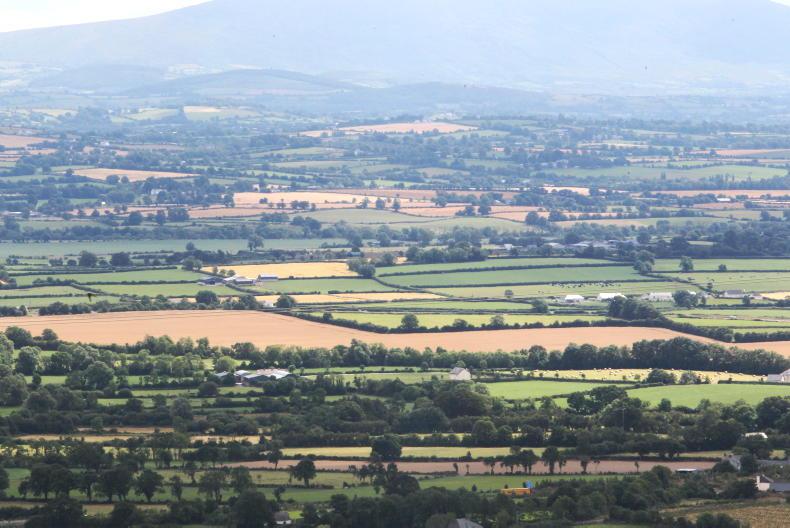
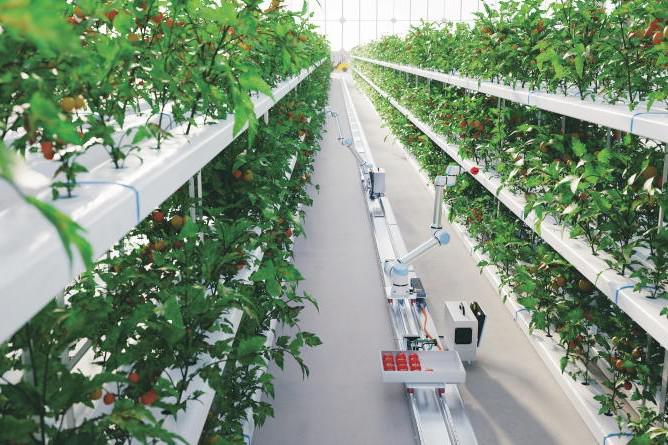
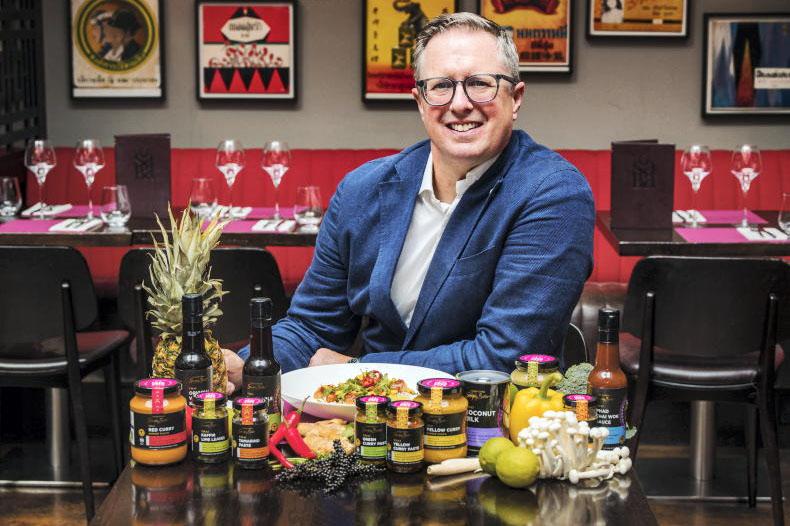
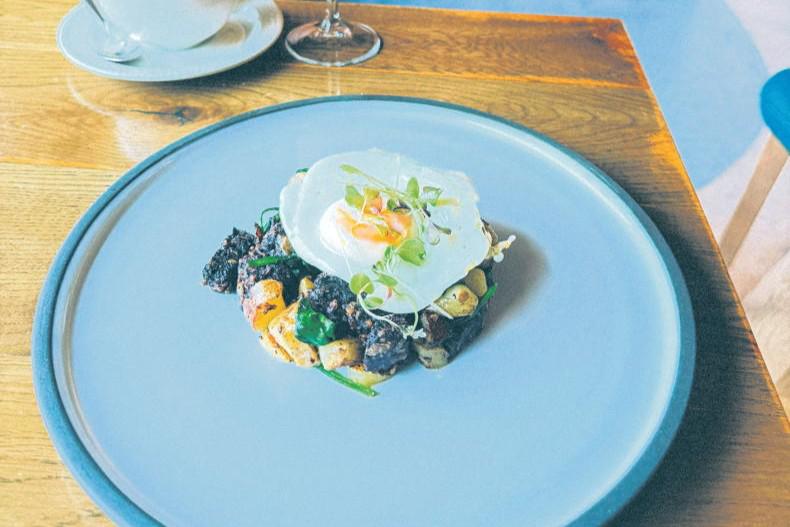
SHARING OPTIONS